新概念英语第二册笔记新版Lesson 18:He often does this
- 格式:docx
- 大小:37.84 KB
- 文档页数:4
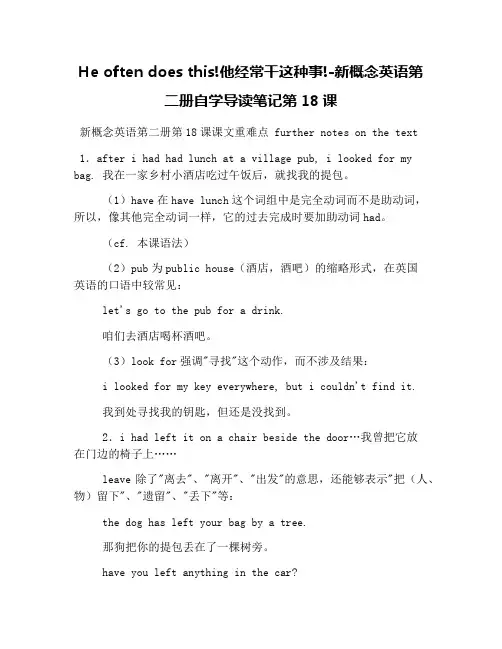
He often does this!他经常干这种事!-新概念英语第二册自学导读笔记第18课新概念英语第二册第18课课文重难点 further notes on the text1.after i had had lunch at a village pub, i looked for my bag. 我在一家乡村小酒店吃过午饭后,就找我的提包。
(1)have在have lunch这个词组中是完全动词而不是助动词,所以,像其他完全动词一样,它的过去完成时要加助动词had。
(cf. 本课语法)(2)pub为public house(酒店,酒吧)的缩略形式,在英国英语的口语中较常见:let's go to the pub for a drink.咱们去酒店喝杯酒吧。
(3)look for强调"寻找"这个动作,而不涉及结果:i looked for my key everywhere, but i couldn't find it.我到处寻找我的钥匙,但还是没找到。
2.i had left it on a chair beside the door…我曾把它放在门边的椅子上……leave除了"离去"、"离开"、"出发"的意思,还能够表示"把(人、物)留下"、"遗留"、"丢下"等:the dog has left your bag by a tree.那狗把你的提包丢在了一棵树旁。
have you left anything in the car?你有没有把什么东西丢在车里?leave the books on the desk.把书放在课桌上。
3.my dog had taken it into the garden. he often doesthis!我的狗把它弄到花园里去了,他常干这种事!he在这里指代的是狗。
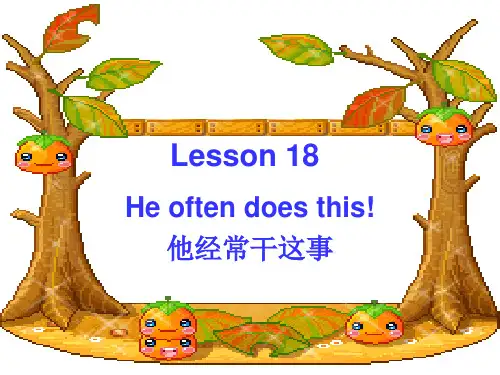
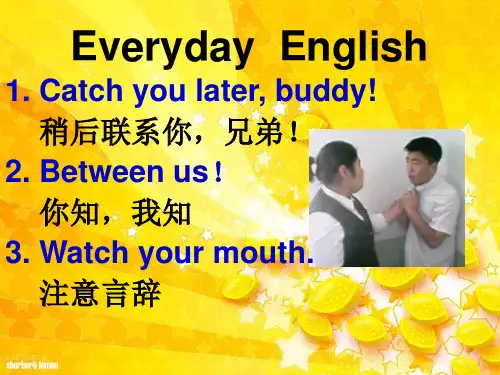
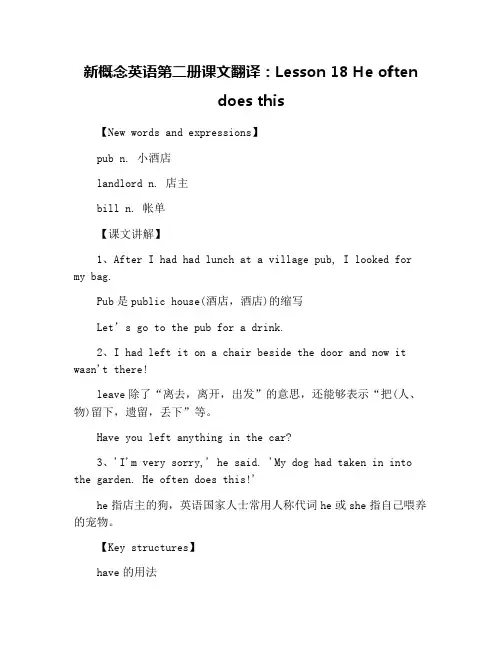
新概念英语第二册课文翻译:Lesson 18 He oftendoes this【New words and expressions】pub n. 小酒店landlord n. 店主bill n. 帐单【课文讲解】1、After I had had lunch at a village pub, I looked for my bag.Pub是public house(酒店,酒店)的缩写Let’s go to the pub for a drink.2、I had left it on a chair beside the door and now it wasn't there!leave除了“离去,离开,出发”的意思,还能够表示“把(人、物)留下,遗留,丢下”等。
Have you left anything in the car?3、'I'm very sorry,' he said. 'My dog had taken in into the garden. He often does this!'he指店主的狗,英语国家人士常用人称代词he或she指自己喂养的宠物。
【Key structures】have的用法1、have作为助动词构成各种完成时和完成实行时2、have还能够作完全动词,当作“具有、拥有”讲时,它和have got通常能够互换。
have做“有, 患病” 概念时, 可作为实义动词, 也可作为非实义动词。
在英国英语中的疑问句和否定句中have(具有)的用法与be相同,即能够不用助动词do或did;在美国英语中,常用do助动词和have一起构成疑问句和否定句。
I don’t h ave a pen/a headache.I haven’t a pen /a headache.三种情况have 能够用 have got取代I have a pen. I have got a pen. “有”I have a headache. I have got a headache. “得病”have to== have got tohave作“具有,拥有”讲时是状态动词,不能用于实行时态或被动语态,通常用于一般现在时。
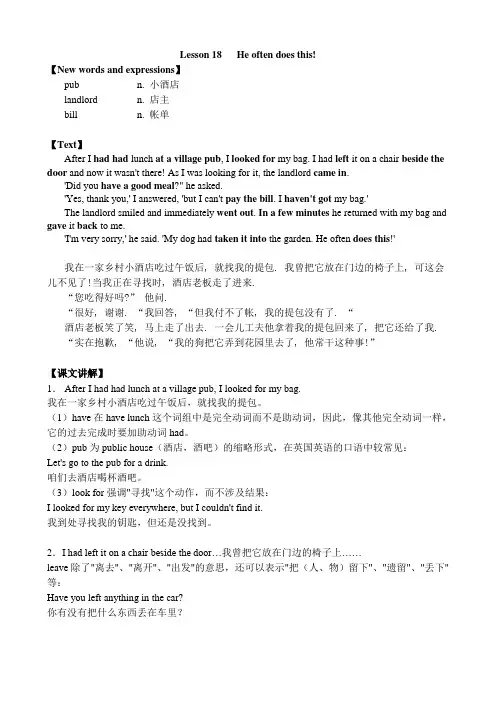
Lesson 18 He often does this!【New words and expressions】pub n. 小酒店landlord n. 店主bill n. 帐单【Text】After I had had lunch at a village pub, I looked for my bag. I had left it on a chair beside the door and now it wasn't there! As I was looking for it, the landlord came in.'Did you have a good meal?" he asked.'Yes, thank you,' I answered, 'but I can't pay the bill. I haven't got my bag.'The landlord smiled and immediately went out. In a few minutes he returned with my bag and gave it back to me.'I'm very sorry,' he said. 'My dog had taken it into the garden. He often does this!'我在一家乡村小酒店吃过午饭后, 就找我的提包. 我曾把它放在门边的椅子上, 可这会儿不见了!当我正在寻找时, 酒店老板走了进来.“您吃得好吗?”他问.“很好, 谢谢. “我回答, “但我付不了帐, 我的提包没有了. “酒店老板笑了笑, 马上走了出去. 一会儿工夫他拿着我的提包回来了, 把它还给了我.“实在抱歉, “他说, “我的狗把它弄到花园里去了, 他常干这种事!”【课文讲解】1.After I had had lunch at a village pub, I looked for my bag.我在一家乡村小酒店吃过午饭后,就找我的提包。
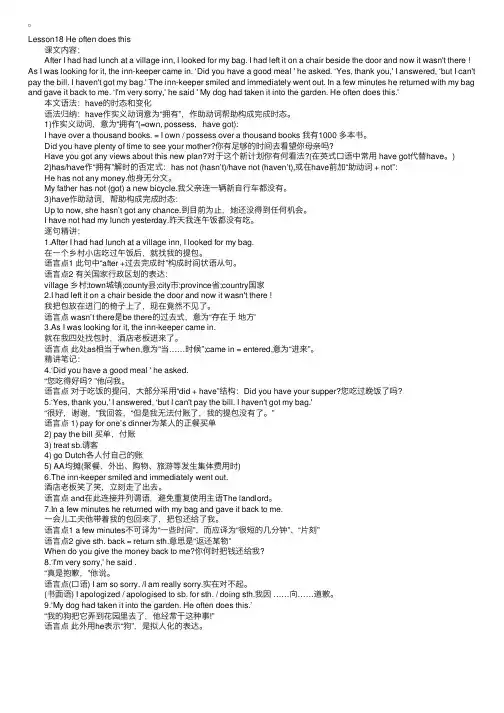
Lesson18 He often does this 课⽂内容: After I had had lunch at a village inn, I looked for my bag. I had left it on a chair beside the door and now it wasn't there ! As I was looking for it, the inn-keeper came in. ‘Did you have a good meal ' he asked. ‘Yes, thank you,' I answered, ‘but I can't pay the bill. I haven't got my bag.' The inn-keeper smiled and immediately went out. In a few minutes he returned with my bag and gave it back to me. ‘I'm very sorry,' he said ' My dog had taken it into the garden. He often does this.' 本⽂语法:have的时态和变化 语法归纳:have作实义动词意为“拥有”,作助动词帮助构成完成时态。
1)作实义动词,意为“拥有”(=own, possess,have got): I have over a thousand books. = I own / possess over a thousand books 我有1000 多本书。
Did you have plenty of time to see your mother?你有⾜够的时间去看望你母亲吗? Have you got any views about this new plan?对于这个新计划你有何看法?(在英式⼝语中常⽤ have got代替have。
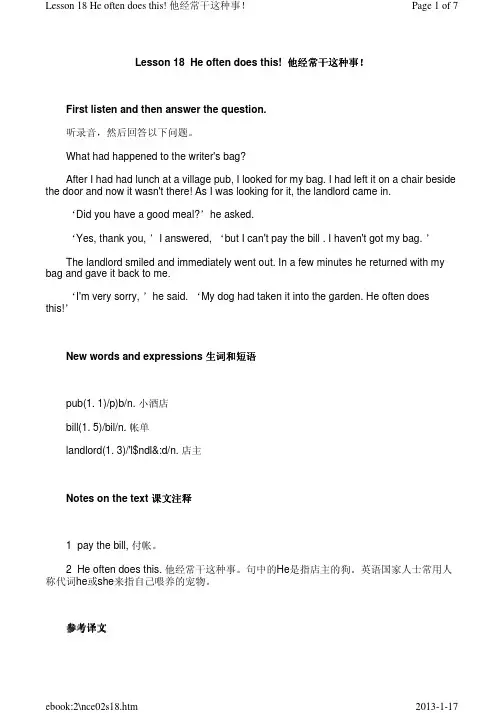
常干这这种事!Lesson 18 He often does this! 他经常干First listen and then answer the question.听录音,然后回答以下问题。
What had happened to the writer's bag?After I had had lunch at a village pub, I looked for my bag. I had left it on a chair beside the door and now it wasn't there! As I was looking for it, the landlord came in.‘Did you have a good meal?’he asked.‘Yes, thank you, ’I answered, ‘but I can't pay the bill . I haven't got my bag. ’The landlord smiled and immediately went out. In a few minutes he returned with my bag and gave it back to me.‘I'm very sorry, ’he said. ‘My dog had taken it into the garden. He often doesthis!’和短语语New words and expressions 生词和短pub(1. 1)/p)b/n. 小酒店bill(1. 5)/bil/n. 帐单landlord(1. 3)/'l$ndl&:d/n. 店主文注释释Notes on the text 课文注1 pay the bill, 付帐。
2 He often does this. 他经常干这种事。
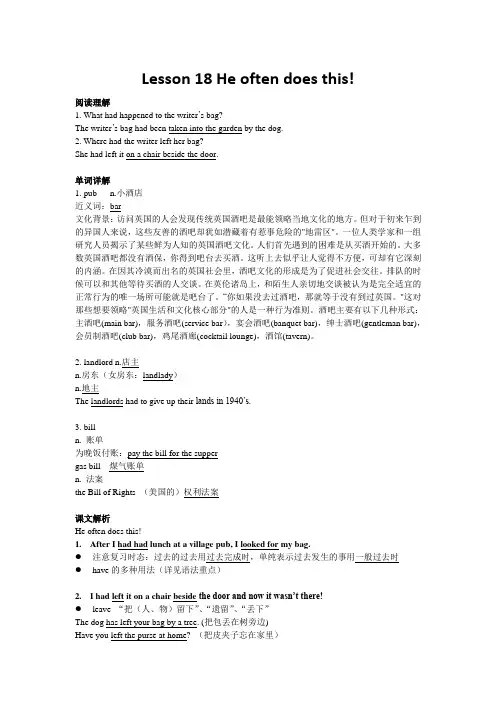
Lesson 18 He often does this!阅读理解1. What had happened to the writer’s bag?The writer’s bag had been taken into the garden by the dog.2. Where had the writer left her bag?She had left it on a chair beside the door.单词详解1. pub n.小酒店近义词:bar文化背景:访问英国的人会发现传统英国酒吧是最能领略当地文化的地方。
但对于初来乍到的异国人来说,这些友善的酒吧却犹如潜藏着有惹事危险的"地雷区"。
一位人类学家和一组研究人员揭示了某些鲜为人知的英国酒吧文化。
人们首先遇到的困难是从买酒开始的。
大多数英国酒吧都没有酒保,你得到吧台去买酒。
这听上去似乎让人觉得不方便,可却有它深刻的内涵。
在因其冷漠而出名的英国社会里,酒吧文化的形成是为了促进社会交往。
排队的时候可以和其他等待买酒的人交谈。
在英伦诸岛上,和陌生人亲切地交谈被认为是完全适宜的正常行为的唯一场所可能就是吧台了。
“你如果没去过酒吧,那就等于没有到过英国。
"这对那些想要领略"英国生活和文化核心部分"的人是一种行为准则。
酒吧主要有以下几种形式:主酒吧(main bar),服务酒吧(service bar),宴会酒吧(banquet bar),绅士酒吧(gentleman bar),会员制酒吧(club bar),鸡尾酒廊(cocktail lounge),酒馆(tavern)。
2. landlord n.店主n.房东(女房东:landlady)n.地主The landlords had to give up their lands in 1940’s.3. billn. 账单为晚饭付账:pay the bill for the suppergas bill 煤气账单n. 法案the Bill of Rights (美国的)权利法案课文解析He often does this!1.After I had had lunch at a village pub, I looked for my bag.●注意复习时态:过去的过去用过去完成时,单纯表示过去发生的事用一般过去时●have的多种用法(详见语法重点)2.I had left it on a chair beside the door and now it wasn’t there!●leave “把(人、物)留下”、“遗留”、“丢下”The dog has left your bag by a tree. (把包丢在树旁边)Have you left the purse at home? (把皮夹子忘在家里)●比较beside与besides①beside prep. 在……旁边,在……附近②besides prep. 除……之外(还)③besides adv. 而且,并且,此外选词填空并翻译句子:I’m quite busy today. Besides, I’ve got a bad cold.我今天很忙,而且我还重感冒了。
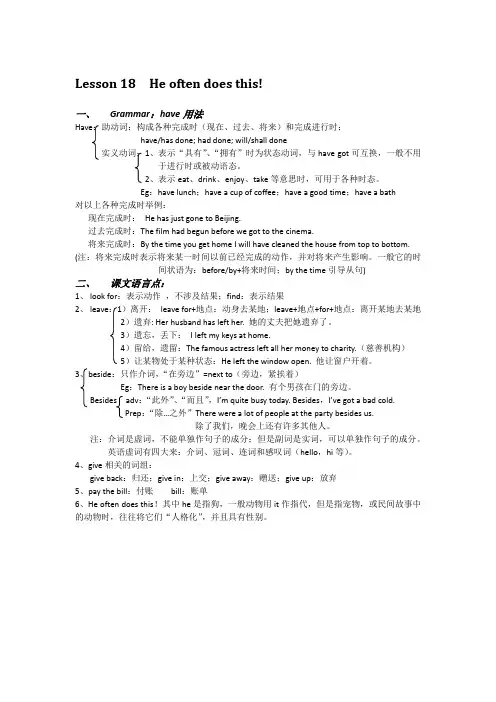
Lesson 18 He often does this!一、Grammar:have用法Have:助动词:构成各种完成时(现在、过去、将来)和完成进行时;have/has done; had done; will/shall done实义动词:1、表示“具有”、“拥有”时为状态动词,与have got可互换,一般不用于进行时或被动语态。
2、表示eat、drink、enjoy、take等意思时,可用于各种时态。
Eg:have lunch;have a cup of coffee;have a good time;have a bath对以上各种完成时举例:现在完成时:He has just gone to Beijing.过去完成时:The film had begun before we got to the cinema.将来完成时:By the time you get home I will have cleaned the house from top to bottom. (注:将来完成时表示将来某一时间以前已经完成的动作,并对将来产生影响。
一般它的时间状语为:before/by+将来时间;by the time引导从句)二、课文语言点:1、look for:表示动作,不涉及结果;find:表示结果2、leave:1)离开:leave for+地点:动身去某地;leave+地点+for+地点:离开某地去某地2)遗弃: Her husband has left her. 她的丈夫把她遗弃了。
3)遗忘,丢下:I left my keys at home.4)留给,遗留:The famous actress left all her money to charity.(慈善机构)5)让某物处于某种状态:He left the window open. 他让窗户开着。
3、beside:只作介词,“在旁边”=next to(旁边,紧挨着)Eg:There is a boy beside near the door. 有个男孩在门的旁边。
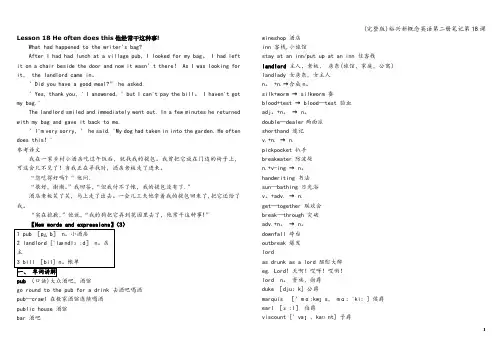
Lesson 18 He often does this他经常干这种事!What had happened to the writer's bag?After I had had lunch at a village pub, I looked for my bag。
I had left it on a chair beside the door and now it wasn’t there! As I was looking for it, the landlord came in。
’Did you have a good meal?” he asked.’Yes, thank you,' I answered, ’but I can't pay the bill。
I haven't got my bag.'The landlord smiled and immediately went out. In a few minutes he returned with my bag and gave it back to me.’I'm very sorry,’ he said. 'My dog had taken in into the garden. He often does this!'参考译文我在一家乡村小酒店吃过午饭后,就找我的提包。
我曾把它放在门边的椅子上,可这会儿不见了!当我正在寻找时,酒店老板走了进来。
“您吃得好吗?”他问.“很好,谢谢。
”我回答,“但我付不了帐,我的提包没有了.”酒店老板笑了笑,马上走了出去。
一会儿工夫他拿着我的提包回来了,把它还给了我。
“实在抱歉,”他说,“我的狗把它弄到花园里去了,他常干这种事!”【New words and expressions】(3)pub(口语)大众酒吧,酒馆go round to the pub for a drink 去酒吧喝酒pub—crawl 在数家酒馆连续喝酒public house 酒馆bar 酒吧wineshop 酒店inn 客栈,小旅馆stay at an inn/put up at an inn 住客栈landlord主人,老板,房东(旅馆,家庭,公寓)landlady 女房东,女主人n。
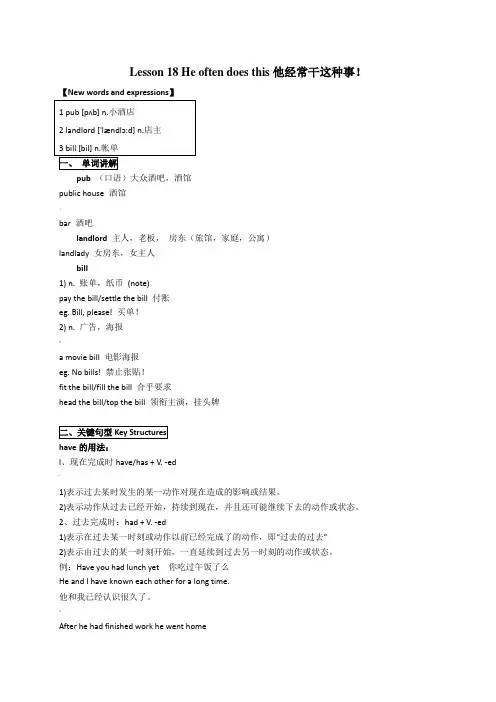
Lesson 18 He often does this他经常干这种事!【New words and expressions】1 pub [pʌb] n.小酒店2 landlord ['lændlɔ:d] n.店主3 bill [bil] n.帐单一、单词讲解pub(口语)大众酒吧,酒馆public house 酒馆、bar 酒吧landlord主人,老板,房东(旅馆,家庭,公寓)landlady 女房东,女主人bill1) n. 账单,纸币(note)pay the bill/settle the bill 付账eg. Bill, please! 买单!2) n. 广告,海报*a movie bill 电影海报eg. No bills! 禁止张贴!fit the bill/fill the bill 合乎要求head the bill/top the bill 领衔主演,挂头牌二、关键句型Key Structureshave的用法:l、现在完成时have/has + V. -ed'1)表示过去某时发生的某一动作对现在造成的影响或结果。
2)表示动作从过去已经开始,持续到现在,并且还可能继续下去的动作或状态。
2、过去完成时:had + V. -ed1)表示在过去某一时刻或动作以前已经完成了的动作,即“过去的过去”2)表示由过去的某一时刻开始,一直延续到过去另一时刻的动作或状态。
例:Have you had lunch yet 你吃过午饭了么He and I have known each other for a long time.他和我已经认识很久了。
~After he had finished work he went home他完成工作后回家了。
We had been waitiing for an hour when he showed up.他出现时,我们己经等了一个小时了。
Lesson18He often Does This◆Warm up1、have/has作实义动词的用法总结2、过去完成时态◆Listening1.Where did the writer have lunch?2.Could she find her bag after her meal?3.Why couldn’t she pay the bill?4.Who soon found it for her?5.Where had his dog taken it?◆Vocabulary●pub[pʌb]n.小酒店【近义】inn n.小旅馆、小酒馆、小饭店bar n.酒吧、柜台go round to the pub for a drink去酒吧喝酒public house酒馆wine shop酒店【例句】We were in the pub until closing time.我们一直呆到酒吧打烊。
●landlord[ˈlændlɔ:rd]n.店主【记忆】landlord=懒得劳动→n.房东,老板,地主【拓展】landlady n.女房东lord n.贵族、勋爵as drunk as a lord酩酊大醉【例句】The landlord had to give up their lands in1930s.●bill[bɪl]n.账单;法案;纸币⑴n.账单Pay the bill for supper为晚饭付账Gas bill煤气账单No bills禁止张贴⑵n.法案Bill of Rights权利法案fit the bill合乎要求⑶n.纸币、钞票a ten-dollar bill一张十美元的钞票◆TextAfter I had had lunch at a village pub,I looked for my bag.I had left it on a chair beside the door and now it wasn't there!As I was looking for it,the landlord came in.‘Did you have a good meal?’he asked.‘Yes,thank you,’I answered,‘but I can't pay the bill.I haven't got my bag.’The landlord smiled and immediately went out.In a few minutes he returned with my bag and gave it back to me.‘I'm very sorry,’he said.‘My dog had taken it into the garden.He often does this!’◆Language points▲After I had had lunch at a village pub,I looked for my bag.⑴一日三餐前不加任何冠词,但三餐前有修饰语时加冠词;have breakfast/lunch/supper/dinner吃早餐/中餐/晚餐have a big dinner吃大餐⑵discover,find,look for,find out用法区别①discover v.发现客观存在的事物、真理或错误,即发现原来客观存在但不为人知的事物。
新概念英语第二册笔记新版Lesson 18:He often
does this
【New words and expressions】生词和短语
★pub n. 小酒店
★landlord n. 店主
★bill n. 帐单
First listen and then answer the question.
听录音,然后回答以下问题。
What had happened to the writer's bag?
After I had had lunch at a village pub, I looked for my bag. I had left it on a chair beside the door and now it wasn't there! As I was looking for it, the landlord came in.
'Did you have a good meal?" he asked.
'Yes, thank you,' I answered, 'but I can't pay the bill.
I haven't got my bag.'
The landlord smiled and immediately went out. In a few minutes he returned with my bag and gave it back to me.
'I'm very sorry,' he said. 'My dog had taken in into the garden. He often does this!'
参考译文
我在一家乡村小酒店吃过午饭后,就找我的提包。
我曾把它放在门边的椅子上,可这会儿不见了!当我正在寻找时,酒店老板走了进来。
“您吃得好吗?”他问。
“很好,谢谢。
”我回答,“但我付不了帐,我的提包没有了。
”
酒店老板笑了笑,马上走了出去。
一会儿工夫他拿着我的提包回
来了,把它还给了我。
“实在抱歉,”他说,“我的狗把它弄到花园里去了,他常干这
种事!”
have的用法:
have dinner,have a cigarette,have coffee,have a
holiday,have a good time
have a swim,have a rest
have a pen,have a headache
have做"有,患病"概念时,可作为实义动词,也可作为非实义
动词。
疑问句和否定句构成:
实义动词:通过助动词
非实义动词:直接加not
have只能作为非实义动词,如果一个词是以完成时态出现的
have只能作为实义动词
I have a holiday.
I don't have a holiday.
【Key structures】
Exercises C
In which of these sentences can we put the verb got after have?
三种情况:那些时候have 能够用 have got取代
①I have a pen. I have got a pen."有"
②I have a headache. I have got a headache."得病"
③have to
以上三种情况have ==have got
⑴...不换...
⑵...换...
有钱
⑶...换...
⑷...不换...
实行
⑸...换...
患病
⑹...不换...
have a good/long time:过的愉快
⑺...换...
⑻...换...
has to
⑼...不换...。